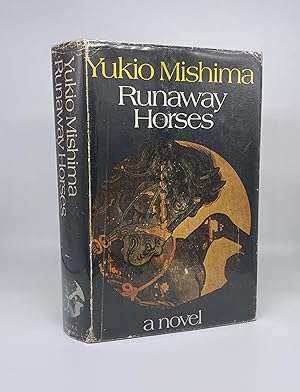
Runaway Horses by Yukio Mishima (first edition)
Check my rate
| Main centres: | 1-3 business days |
| Regional areas: | 3-4 business days |
| Remote areas: | 3-5 business days |

| Main centres: | 1-3 business days |
| Regional areas: | 3-4 business days |
| Remote areas: | 3-5 business days |
Set between June 1932 and December 1933, Runaway Horses tells the story of young Isao Iinuma, a rightist reactionary trained in the samurai code by his father. Isao becomes the instigator of a plot to topple the zaibatsu that he feels have corrupted the Yamato-damashii and betrayed the will of the Emperor. He is assured of the army's assistance by the young Lieutenant Hori. They plan to assassinate many key government figures simultaneously on December 3, 1932.
Shigekuni Honda, a character who figured prominently in Spring Snow, the first novel of the cycle, appears again here as a judge and later lawyer. He comes to believe that Isao is the reincarnation of Kiyoaki Matsugae, the aristocratic schoolfriend whose story was told in Spring Snow. Realising that Isao too seems to be hurtling towards a "picturesque" death, he makes strenuous efforts to save him without revealing this personal connection.
Yukio Mishima ( ) was born in Tokyo in 1925. He graduated from Tokyo Imperial Universitys School of Jurisprudence in 1947. His first published book, The Forest in Full Bloom, appeared in 1944 and he established himself as a major author with Confessions of a Mask (1949). From then until his death he continued to publish novels, short stories, and plays each year. His crowning achievement, the Sea of Fertility tetralogywhich contains the novels Spring Snow (1969), Runaway Horses (1969), The Temple of Dawn (1970), and The Decay of the Angel (1971)is considered one of the definitive works of twentieth-century Japanese fiction. In 1970, at the age of forty-five and the day after completing the last novel in the Fertility series, Mishima committed seppuku (ritual suicide)a spectacular death that attracted worldwide attention.